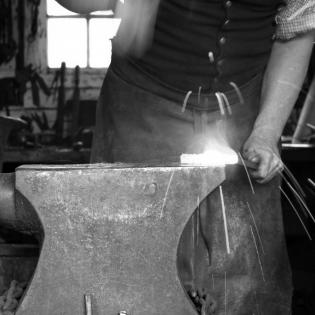Early American Influences
How does a community form to address issues for the common good?
Photo Credit: Blacksmith at Work - Colonial Williamsburg by Derek Key is licensed under CC by 2.0
Stories of four different populations teach about the civic influences in history. Literature and documents show the origins of the Core Democratic Values and the development of the United States of America.
Introduce the philanthropic behavior of Native Americans through the speech attributed to Chief Seattle, using the book Brother Eagle, Sister Sky: The Words of Chief Seattle.
We learn how different groups coming together for the good of all established the Mayflower Compact. This brief agreement was the first document of its kind designed to bring a community together to focus on the common good. This may be a model for a group agreement written by the participants.
We look at the Society of Friends/Quakers and describe how this group promoted the common good. The Quakers pushed for religious freedom and freedom of choice, which are Core Democratic Values. As a group, they formed organizations to promote social change in the areas of slavery, prison conditions, poverty, Native American affairs and other social causes.
Benjamin Franklin's work was in service to making a better world, and he influenced the nonprofit sector. His book, Poor Richards Almanack, makes connections to the common good through personal virtue and actions. The participants choose quotes to create posters that communicate their commitment to the common good.
